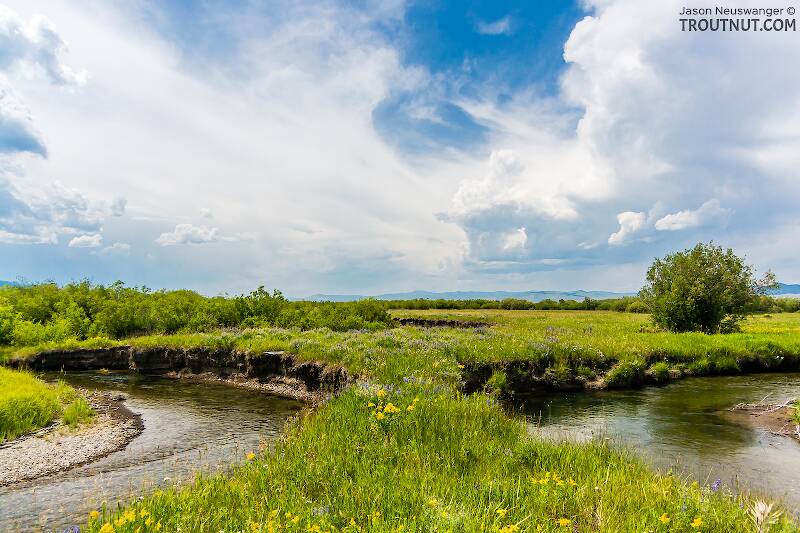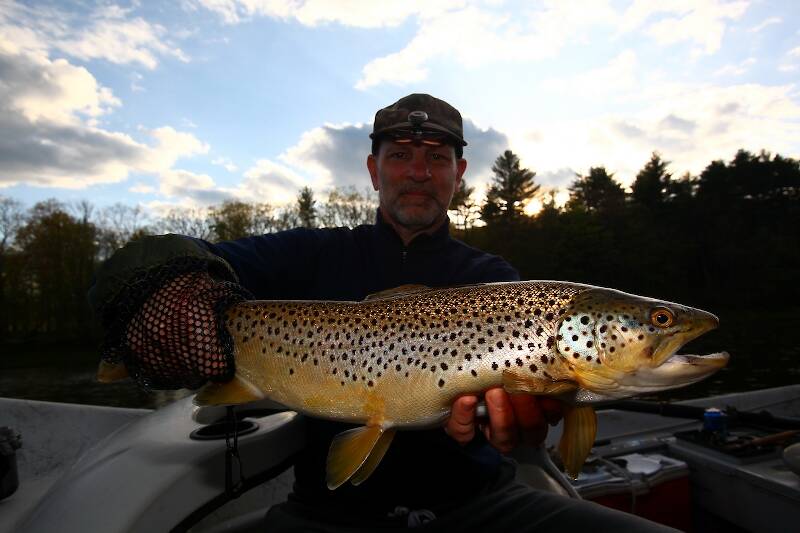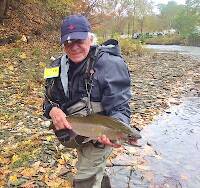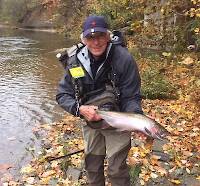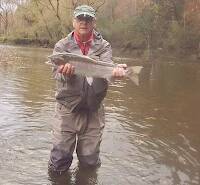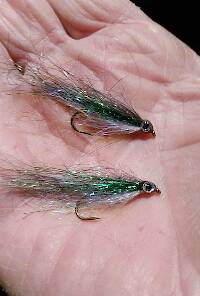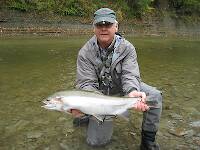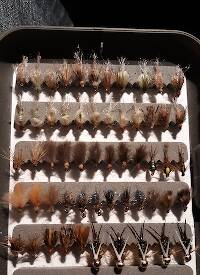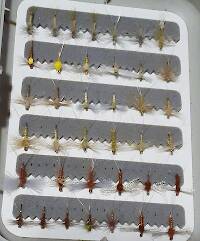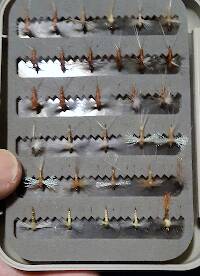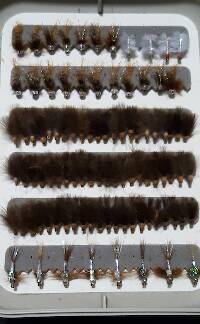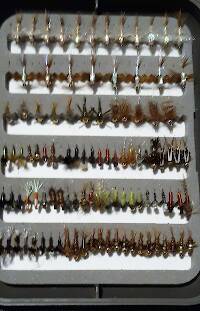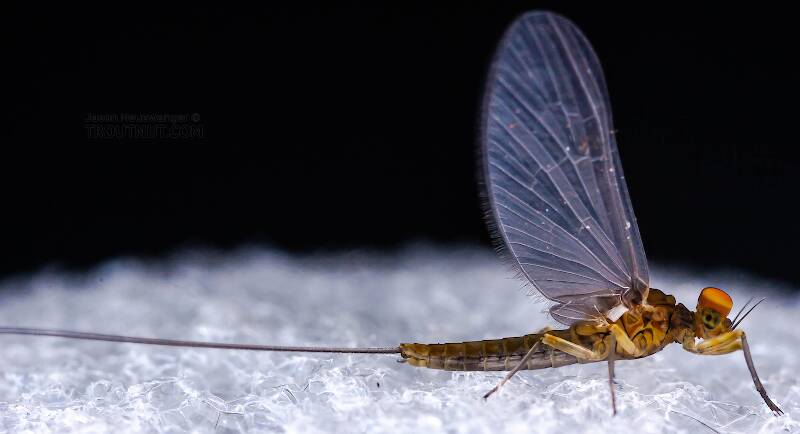
Blue-winged Olives
Baetis
Tiny Baetis mayflies are perhaps the most commonly encountered and imitated by anglers on all American trout streams due to their great abundance, widespread distribution, and trout-friendly emergence habits.
Featured on the forum
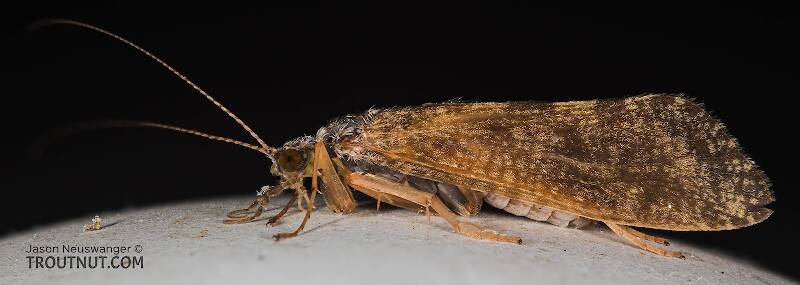

Troutnut is a project started in 2003 by salmonid ecologist Jason "Troutnut" Neuswanger to help anglers and
fly tyers unabashedly embrace the entomological side of the sport. Learn more about Troutnut or
support the project for an enhanced experience here.
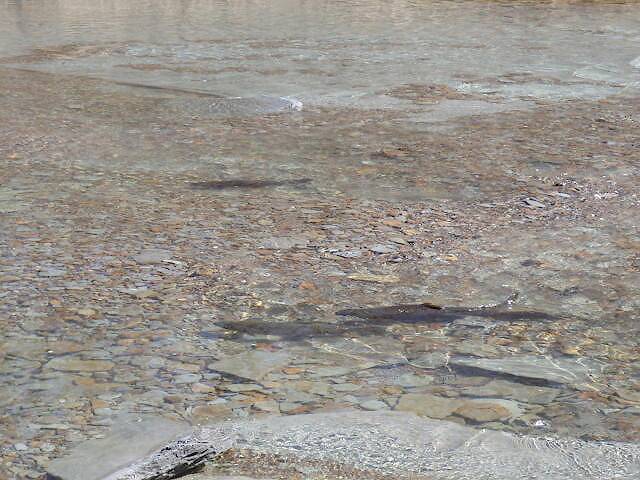
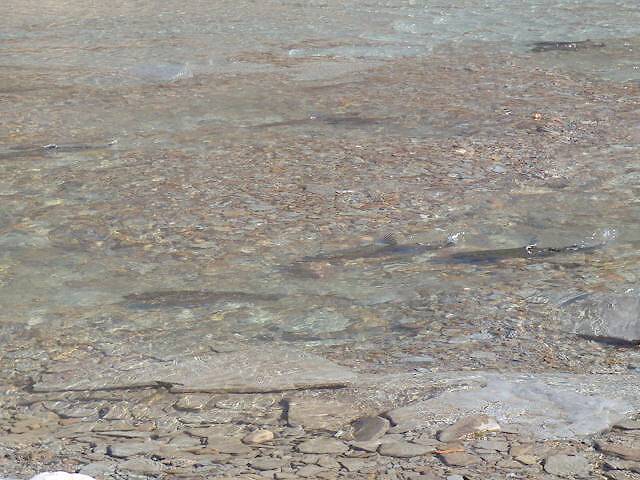
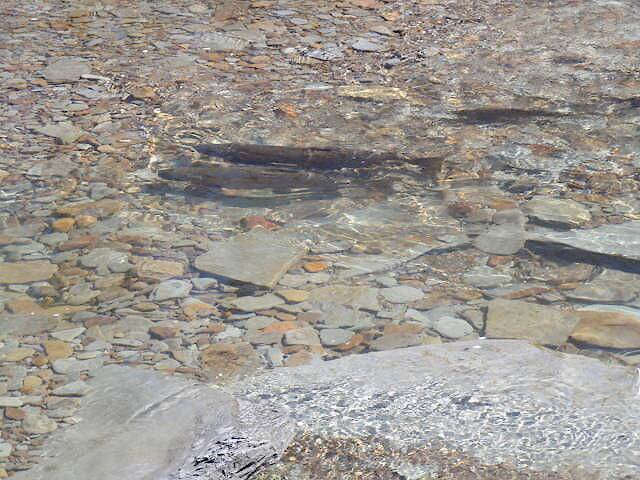
JAD on Mar 27, 2009March 27th, 2009, 10:47 am EDT
I thought this might be of interest.
John
John
They fasten red (crimson red) wool around a hook, and fix onto the wool two feathers which grow under a cock’s wattles, and which in colour are like wax.
Radcliffe's Fishing from the Earliest Times,
GONZO on Mar 27, 2009March 27th, 2009, 12:34 pm EDT
Nice, John. Although it used to be an annual ritual for me, it's been several years since I've had the opportunity to fish for steelhead. Pictures like this bring the fever back.
Your pics make me wonder about the percentage of attempted spawning that is successful (yields adult streambred fish) in Erie streams. I've heard that it is negligible due to the nature of these streams, but I'm much more familiar with the Ontario tribs.
For example, on the Salmon River--which has a very different physical character than most of the Erie streams--the hatchery fish were fin clipped according to strain. (As I recall, a ventral fin was clipped on Chambers Creek strain steelies and a pectoral fin was clipped on Skamania/"summer-run" fish. But it's been awhile, and I might be misremembering that.) The fin clipping made it easier to estimate numbers of "wild" fish spawned in the river or its tributaries. From anecdotal estimates of my own catch, the numbers of streambred fish on the Salmon seemed to approach almost 50% in some years.
I'm especially interested to learn whether any of the Erie streams have significantly better habitat for successful spawning than others. Do you have any thoughts, or have you seen any information about this?
Your pics make me wonder about the percentage of attempted spawning that is successful (yields adult streambred fish) in Erie streams. I've heard that it is negligible due to the nature of these streams, but I'm much more familiar with the Ontario tribs.
For example, on the Salmon River--which has a very different physical character than most of the Erie streams--the hatchery fish were fin clipped according to strain. (As I recall, a ventral fin was clipped on Chambers Creek strain steelies and a pectoral fin was clipped on Skamania/"summer-run" fish. But it's been awhile, and I might be misremembering that.) The fin clipping made it easier to estimate numbers of "wild" fish spawned in the river or its tributaries. From anecdotal estimates of my own catch, the numbers of streambred fish on the Salmon seemed to approach almost 50% in some years.
I'm especially interested to learn whether any of the Erie streams have significantly better habitat for successful spawning than others. Do you have any thoughts, or have you seen any information about this?
JAD on Mar 27, 2009March 27th, 2009, 1:35 pm EDT
Lloyd I don't think their is any natural reproduction. That is a pretty flat statement, that scares me, if their is any it is minimal.
Did you see the article about the Little j, the fish commission is going to start fin clipping the stocked fingerlings.
http://www.paflyfish.com/modules/newbb/viewtopic.php?topic_id=6908&forum=2
Tight Lines
John
Did you see the article about the Little j, the fish commission is going to start fin clipping the stocked fingerlings.
http://www.paflyfish.com/modules/newbb/viewtopic.php?topic_id=6908&forum=2
Tight Lines
John
They fasten red (crimson red) wool around a hook, and fix onto the wool two feathers which grow under a cock’s wattles, and which in colour are like wax.
Radcliffe's Fishing from the Earliest Times,
DOS on Mar 27, 2009March 27th, 2009, 2:03 pm EDT
Hey Gonzo,
I believe the only LO Chambers Creek strain that are currently being clipped are are those of the broodstock, which the NYSDEC uses for egg collection. All the Skamania strain have continued to be clipped. This could change soon since the NYSDEC has purchased a clipping machine and truck with funds from a recent $12 Mill. reclamation settlement from a chemical company.
It seems that the big news on natural reproduction occurring in the Salmon River has been with salmon and not steelhead. I believe the reason is that steelhead require a full year of development in the river after hatching, before they travel out to the lake and the salmon only require several months, avoiding the warmer water temperatures of summer.
A recent SUNY ESF study found that ...
Here is a link to Dustin's research http://www.esf.edu/salmon/juvenilesalmon.htm
In regards to NY's Lake Erie tributaries, the DEC contends that conservatively, 25% of the fish returning to Cattaraugus Creek are progeny of natural reproduction. Also, they have determined that there is some natural reproduction occurring on NY's Chautauqua creek. There is also a small amount of Chinook salmon natural reproduced on Cattaraugus creek, they were last stocked in the early 90's and incidental catches and carcasses are reported each year. http://www.dec.ny.gov/docs/fish_marine_pdf/fishpasscattck.pdf
I believe the only LO Chambers Creek strain that are currently being clipped are are those of the broodstock, which the NYSDEC uses for egg collection. All the Skamania strain have continued to be clipped. This could change soon since the NYSDEC has purchased a clipping machine and truck with funds from a recent $12 Mill. reclamation settlement from a chemical company.
It seems that the big news on natural reproduction occurring in the Salmon River has been with salmon and not steelhead. I believe the reason is that steelhead require a full year of development in the river after hatching, before they travel out to the lake and the salmon only require several months, avoiding the warmer water temperatures of summer.
A recent SUNY ESF study found that ...
five to ten million Chinook salmon were naturally reproduced in the Salmon River in 2005. A five million- fish finding comes from a New York Sea Grant-funded project carried out by State University of New York College of Environmental Sciences and Forestry (SUNY ESF) graduate student Dustin Everitt. In fact, SUNY ESF Dean of Research Dr. Neil H. Ringler says, "The calculations are actually quite conservative, and the number of juvenile Chinook for 2005 could easily have been close to ten million fish." Everitt worked under the guidance of Ringler, assisted by Michael Connerton, and with hydroacoustic analysis expertise from Cornell University's Dr. Lars Rudstam.
Here is a link to Dustin's research http://www.esf.edu/salmon/juvenilesalmon.htm
In regards to NY's Lake Erie tributaries, the DEC contends that conservatively, 25% of the fish returning to Cattaraugus Creek are progeny of natural reproduction. Also, they have determined that there is some natural reproduction occurring on NY's Chautauqua creek. There is also a small amount of Chinook salmon natural reproduced on Cattaraugus creek, they were last stocked in the early 90's and incidental catches and carcasses are reported each year. http://www.dec.ny.gov/docs/fish_marine_pdf/fishpasscattck.pdf
Andrew Nisbet
GONZO on Mar 27, 2009March 27th, 2009, 3:52 pm EDT
That's good news about the fin clipping, John. It should eventually help to prove what most of the regulars have long suspected about natural reproduction on the Little J.
Thanks for the insights, updates, and links about salmon/steelhead spawning on the NY tribs, Drew. Good stuff! (The report on possible changes to Springville Dam on Cattaraugus Ck. was especially interesting.)
Thanks for the insights, updates, and links about salmon/steelhead spawning on the NY tribs, Drew. Good stuff! (The report on possible changes to Springville Dam on Cattaraugus Ck. was especially interesting.)
RleeP on Nov 4, 2009November 4th, 2009, 10:39 am EST
Well, nothing like showing up a little late to comment on a thread...
I haven't been around much lately. But if it helps, I have a note of excusal from my urologist, who insisted on taking my prostate out this past Summer. This was done on 7/1 and by 8/10, I was up wading the Milwaukee River for smallmouth. I could only last for a couple hours at a time, but I was by God there...:)
Watch for my upcoming dissertation in the AMA Journal on the impact of wading uneven substrate on post-prostatectomy stress incontinence. I found it to be significant...:)
Oh, I had my first post-op PSA in September and I am (as best they know) cancer free. This is good. It's why we pay Blue Cross.
Anyhow, I wanted to respond to Gonzo, who asked:
""I'm especially interested to learn whether any of the Erie streams have significantly better habitat for successful spawning than others. Do you have any thoughts, or have you seen any information about this?"
Years ago, when I was writing regularly for the Angler, I did a feature on Conneaut Creek. The Area 1 AFM at the time was Craig Billingsley and he basically told me that Conneaut was the only one of the tribs with any PA mileage (the top approx. 60% or so of the watershed before it veers west into Ohio) that turned any noticeable numbers of wild steelhead. He said they took a number of surveys in and above the approved trout waters section of Conneaut in Crawford County where they shocked up pretty fair numbers of wild steelhead.
He also said there was limited reproduction in Temple Run, a Conneaut trib that enters near Albion.
Elsewise, there is very little reproduction, even in the nursery streams like Trout and Godfrey Runs. As I understand it, there is a triple whammy at work in the watershed: 1) The mixing of strains (and hence their spawning timing) over the past 30-40 years. 2) The shale substrate of the majority of the watershed. It doesn't just fail to hold eggs, where it is fine enough to be similar to gravel, it moves precipitously with every significant high water event. 3) Groundwater recharge, while pretty good in very small spring tribs that run directly to the Lake (and upon which 3CU has built its raceways) is pretty poor in terms of contribution to virtually all the PA tribs. So, even in the event that some steelhead do successfully spawn in some of the (in particular) tribs of Elk, sustained flows are too erratic to get the fry through to swim up.
I think the whole thing is geological. If you look at a drainage map, the basin is very narrow except for the Conneaut Creek drainage which dips way south. Evidently it made a gap that allows it to headwater in an area where there is enough real gravel and sufficient groundwater recharge to allow some reproduction.
So, it will always be a Fritos fishery.
A couple of interesting things though about it all are that: 1) There are wild trout (and well established at that) in some of the small tribs of Elk and Walnut. But they are browns and they pre-date the catchable stocking switch from RT to BT that took place at least 30 years ago. My Dad grew up near a place on Walnut called Weis Library and at that time, there were wild brookies in Thomas Run, a Walnut Creek trib that enters slightly upstream from PA 832. This was in the 30's and 40's. 2) Immediately south of the drainage break are the headwaters of a couple of the most potent wild brown trout streams in NW PA with excellent flows and strong spring recharge. The headwaters of Elk Creek and the headwaters of one of these streams are about 100 yards apart along PA 86 south of Erie. This stream, back when they were sampling it (it is all posted now) routinely electrofished in the 90 to 110 kg/ha range. So, something pretty significant in geological/hydrological terms happens pretty abruptly here.
It's a strange place, but it's home...
I haven't been around much lately. But if it helps, I have a note of excusal from my urologist, who insisted on taking my prostate out this past Summer. This was done on 7/1 and by 8/10, I was up wading the Milwaukee River for smallmouth. I could only last for a couple hours at a time, but I was by God there...:)
Watch for my upcoming dissertation in the AMA Journal on the impact of wading uneven substrate on post-prostatectomy stress incontinence. I found it to be significant...:)
Oh, I had my first post-op PSA in September and I am (as best they know) cancer free. This is good. It's why we pay Blue Cross.
Anyhow, I wanted to respond to Gonzo, who asked:
""I'm especially interested to learn whether any of the Erie streams have significantly better habitat for successful spawning than others. Do you have any thoughts, or have you seen any information about this?"
Years ago, when I was writing regularly for the Angler, I did a feature on Conneaut Creek. The Area 1 AFM at the time was Craig Billingsley and he basically told me that Conneaut was the only one of the tribs with any PA mileage (the top approx. 60% or so of the watershed before it veers west into Ohio) that turned any noticeable numbers of wild steelhead. He said they took a number of surveys in and above the approved trout waters section of Conneaut in Crawford County where they shocked up pretty fair numbers of wild steelhead.
He also said there was limited reproduction in Temple Run, a Conneaut trib that enters near Albion.
Elsewise, there is very little reproduction, even in the nursery streams like Trout and Godfrey Runs. As I understand it, there is a triple whammy at work in the watershed: 1) The mixing of strains (and hence their spawning timing) over the past 30-40 years. 2) The shale substrate of the majority of the watershed. It doesn't just fail to hold eggs, where it is fine enough to be similar to gravel, it moves precipitously with every significant high water event. 3) Groundwater recharge, while pretty good in very small spring tribs that run directly to the Lake (and upon which 3CU has built its raceways) is pretty poor in terms of contribution to virtually all the PA tribs. So, even in the event that some steelhead do successfully spawn in some of the (in particular) tribs of Elk, sustained flows are too erratic to get the fry through to swim up.
I think the whole thing is geological. If you look at a drainage map, the basin is very narrow except for the Conneaut Creek drainage which dips way south. Evidently it made a gap that allows it to headwater in an area where there is enough real gravel and sufficient groundwater recharge to allow some reproduction.
So, it will always be a Fritos fishery.
A couple of interesting things though about it all are that: 1) There are wild trout (and well established at that) in some of the small tribs of Elk and Walnut. But they are browns and they pre-date the catchable stocking switch from RT to BT that took place at least 30 years ago. My Dad grew up near a place on Walnut called Weis Library and at that time, there were wild brookies in Thomas Run, a Walnut Creek trib that enters slightly upstream from PA 832. This was in the 30's and 40's. 2) Immediately south of the drainage break are the headwaters of a couple of the most potent wild brown trout streams in NW PA with excellent flows and strong spring recharge. The headwaters of Elk Creek and the headwaters of one of these streams are about 100 yards apart along PA 86 south of Erie. This stream, back when they were sampling it (it is all posted now) routinely electrofished in the 90 to 110 kg/ha range. So, something pretty significant in geological/hydrological terms happens pretty abruptly here.
It's a strange place, but it's home...
Martinlf on Nov 4, 2009November 4th, 2009, 11:55 am EST
Very interesting. Glad to hear you've had a good news on the medical front. Go get those steelies.
"He spread them a yard and a half. 'And every one that got away is this big.'"
--Fred Chappell
--Fred Chappell
Quick Reply
Related Discussions
Topic
Replies
Last Reply
6
Dec 7, 2012
by Pryal74
by Pryal74

